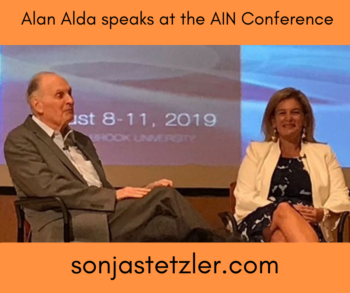Improv Techniques Can Bring New Life To Your Speaking Engagements
In August I attended the Applied Improvisation Network’s annual conference in Stony Brook, New York. Applied Improvisation is the practice of applying and developing the same skills that actors or musicians use, but in contexts that are not linked to the stage. I find the techniques useful in my work as a coach, consultant, and especially when I deliver speaking presentations or workshops.
Many meeting planners are asking if speaking presentations are interactive, as interactivity garners better conference scores, speaker scores, and higher value for audiences. Improv games/exercises are vehicles for getting my message across, and they enable my audiences to experience a new concept or skill that corresponds to my speaking presentation topics. Additionally, debriefing the activity allows my audience to critically think and reflect on what they have just learned. It makes the learning sticky.
There were so many interesting topics and sessions at this year’s conference. Here are a few of the highlights of the conference:
 Actor Alan Alda was a keynoter for the conference. Alda, who began his career in the 1950’s as an improvisational actor (long before his stint as lead actor on M*A*S*H), has trained thousands of scientists to become better communicators through improv. The Center for Communicating Science at Stony Brook which is named after Alda, offers numerous events that teach the art of communication. Some of the Center’s programs are free of charge. (Alda Center) “Communication is not something you add on to science, it is the essence of science.”- Alan Alda
Actor Alan Alda was a keynoter for the conference. Alda, who began his career in the 1950’s as an improvisational actor (long before his stint as lead actor on M*A*S*H), has trained thousands of scientists to become better communicators through improv. The Center for Communicating Science at Stony Brook which is named after Alda, offers numerous events that teach the art of communication. Some of the Center’s programs are free of charge. (Alda Center) “Communication is not something you add on to science, it is the essence of science.”- Alan Alda
Another keynoter was Dr. Sivasailam “Thiagi” Thiagarajan, known in the training world as just “Thiagi’. Dr. Thiagi is on a mission to help people improve their workplace performance effectively and enjoyably. He creates one game per day to forward this mission. His website offers hundreds of activities and games (many that have been borrowed from improv) that can be useful to help drive home your key messages (The Thiagi Group)
Gary Hirsch owns On Your Feet in Portland, Oregon. He offers these tips for meeting your clients’ outcomes and needs when developing workshops using improv. These tips can be used for any interactive presentation:
1. With every activity/game, the audience members connect with others. This interaction heightens the experience of the presentation for most audience members in a positive way.
2. Every activity has to have an objective. A guiding rule of thumb is to ask yourself, “what will they leave with after the workshop?”
3. Listen for what your client cares about. Use active listening and phrasing like, “Based on what I heard you say, it sounds like you care about…”. Probe further with, “Why is that important to you?” This can help your client figure out what they really want – sometimes they need a sounding board to get clarity on what they are looking for. This helps you tailor your program so that they get the outcomes they are looking for (and you get repeat business!)
Ed Reggi, trainer and teaching artist COCAbiz in St. Louis, delivered a workshop on the Importance of the Debrief. He sees “improv exercises and games as vehicles to get our message across, and the debrief allows our audiences to do the critical thinking on how to apply what they have just experienced to their own lives.” The debrief after each exercise/game is what makes applied improvisation so powerful.
One of the best parts of this conference was the AINx Talks. Similar to the TED-style format, the AINx Talks demonstrated the versatile and creative use of improv outside of the typical way many think of improv – as comedy. Unfortunately, the 2019 AINx Talks have not been uploaded yet. So here are links to a couple of previous years’ talks:
AINx Talks 2017: Why Leaders Need Improv – Andrew Tarvin
AINx Talks 2017: The Detroit Creativity Project – Marc Evan Jackson
The 2019 AINx Talks are definitely worth watching!
Announcement: My new website is now up and running – take a look at sonjastetzler.com.
